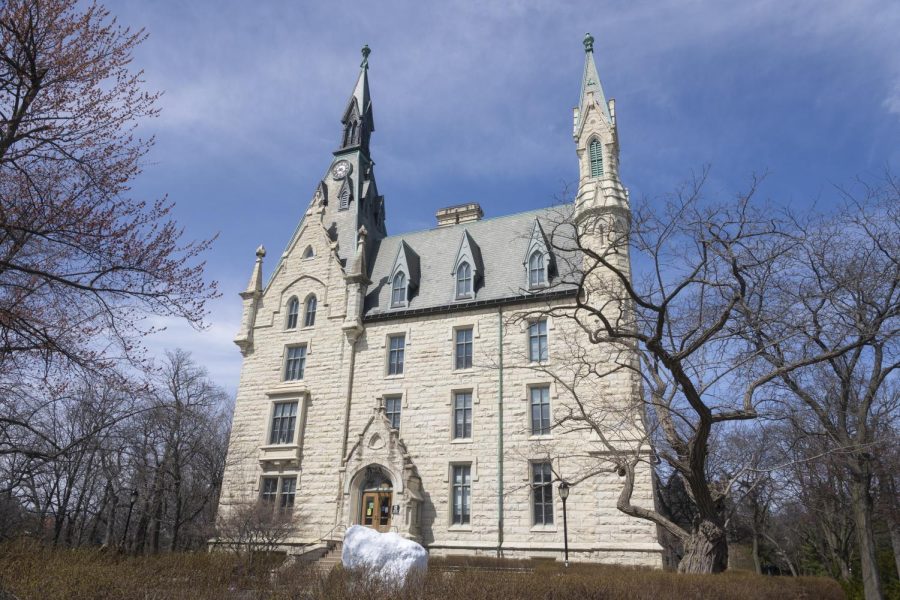Panelists speak on incarcerated women’s experiences at Undergraduate Prison Education Partnership event
Daily file photo by Ava Mandoli
University Hall. Panelists joined the event both in-person and over Zoom.
February 1, 2023
Content warning: This article contains mentions of sexual violence.
Undergraduate Prison Education Partnership, the undergraduate wing of Northwestern Prison Education Program, hosted two panelists at University Hall on Tuesday to discuss women’s unequal treatment in correctional facilities through an intersectional lens.
The event featured three topics: healthcare barriers, violence from correctional officers and the limitations of reentry services.
“We have to understand prisons as places of deprivation, so the conditions within prison are abusive and allow abuse to happen,” panelist and University of Chicago Prof. Gina Fedock said.
Panelist Maria Garza, co-founder of the nonprofit Challenge II Change and NPEP student, spoke on her experiences at the Lincoln Correctional Center in Illinois’ Logan County.
Garza said when she sought mental health support in prison, she was prescribed “heavy-duty” medication without a long-term treatment plan or therapy.
“The process of emotional therapy and stuff like that doesn’t exist,” Garza said. “How is that successful mental health (support), that you’re coming out of the prison system worse than when you went in?”
Many patients have withdrawal symptoms after leaving prison, Garza said, because they are suddenly deprived of the pharmaceuticals and previously-accessible medical services.
Initially, Garza said she was unable to get a biopsy after receiving a concerning mammogram scan. She said she received a biopsy only after repeatedly asking for an appointment.
Incarcerated women’s health was not prioritized, Garza said, and inequities were only exacerbated by the COVID-19 pandemic. With increased risks of exposure to COVID-19 within prisons, medical facilities had few openings and prioritized non-incarcerated individuals, she said.
“It’s the fact that if you’re going to roll the dice on anybody, you’re not going to roll the dice on a prisoner over someone on the outside,” Garza said.
Garza and Fedock also discussed high rates of sexual violence and abuse in correctional facilities and difficulties in filing grievances.
According to Fedock, the prison system reinforces a loss of privacy through shared spaces between inmates and invasive physical searching.
“This is a culture of silence, that correctional officers protect each other,” Fedock said. “It is all built to protect staff and not to preserve the dignity and safety of those who are incarcerated.”
Fedock also said marginalized communities, including impoverished people and people of color, are disproportionately incarcerated. Garza said this population is the most vulnerable to staff abuse and intimidation.
By the time ex-convicts are able to leave prison, Fedock said they are essentially starting their lives over, since many must not only find work and housing but also cope with the mental toll of reintegration.
Reentry programs are often insufficient and many programs only offer services to men, she said.
“I’m a success story,” Garza said. “I believe that we are greater than our worst mistake, but the prison system doesn’t believe that, so they’re never going to give you something to make sure that on the inside, you are reforming yourself successfully.”
Weinberg junior and UPEP Events Chair Ji Yoon Yang said the undergraduate organization was excited to host an identity-based event focusing on the experiences of female-identifying individuals in the prison system.
Yang said UPEP invited both panelists in order to represent a combination of Garza’s lived experience with Fedock’s academic knowledge. She also emphasized the importance of integrating NPEP students with the broader NU community.
“We want to make sure that they still feel included as a Northwestern student because they’re no different from you and I in that we’re both working towards Northwestern degrees,” Yang said.
Email: [email protected]
Twitter: @fionaroach03
Related Stories:
— NPEP expands to provide higher education to incarcerated women
— Northwestern’s volunteer groups kick into gear for winter quarter












